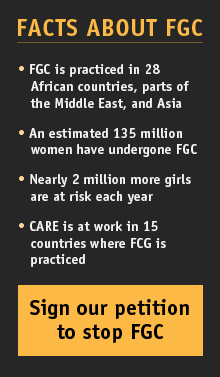
Dear Melissa,
There's no getting around it: The practice of female genital cutting is deeply disturbing to talk about.
But discussing it is important. Every day, in countries across Africa, the Middle East and Asia, as many as 6,000 girls risk undergoing this painful procedure. The consequences for their health and emotional well-being can be severe.
Through CARE, you and I have a very real chance to help communities abandon this practice and prevent the pain and suffering it causes. The first step is simple, but tremendously important: Read on to learn more about FGC and how you can help fight it.
 What is Female Genital Cutting?
What is Female Genital Cutting? The term FGC refers to several different forms of cutting. Infibulation, the most severe, involves the removal of all or part of the external genitalia, leaving only a small opening for urine and menstruation. The cutting usually takes place before the age of 12.
Despite complications that can include severe bleeding, infection, long-term difficulties with intercourse and childbirth, and even death, many communities see FGC as part of their cultural heritage and a valued rite of passage. Both men and women sanction the practice as a way to ensure a girl's virginity before marriage, fulfill a religious obligation and maintain their cultural identity.
Why CARE is uniquely able to help.
Through years of working side by side with communities on agricultural, health and education projects, CARE has proven our compassion and commitment. Building on this foundation of trust, we are in a unique position to respectfully open up a community dialogue about abandoning FGC. Our approach includes:
— Educating key "change agents." Support from community leaders, religious leaders and village elders for abandoning FGC is essential to our success. By working with these respected members of the community, we can promote effective, lasting change.
— Starting a community dialogue. In many communities, FGC is rarely talked about, let alone a subject for public debate. CARE helps to bring men and women together to talk about the issues openly, beginning discussions that examine the value of FGC and throw light on its harmful consequences.
— Supporting individual change. The first people to stand up against FGC often face serious challenges in the community. CARE has helped to organize "safe houses" and support groups for families who publicly renounce FGC.
Slowly but surely, we're making progress. We have already seen changes that would have seemed impossible a few years ago. Communities are now having public discussions about alternatives to FGC. Women are taking more active roles in the debate. In some areas, entire villages have abandoned the practice.
I am encouraged by the progress we've made in several communities, but there is still much to be done. And that's where you come in. Please, take the first step today to help us end female genital cutting. Click here to sign our petition to end FGC.
With your support, I know we can help more and more communities stop FGC. Together, we can make a real difference in the lives of women around the world.
Sincerely,
Helene D. Gayle MD, MPH
President and CEO, CARE




Shakesville is run as a safe space. First-time commenters: Please read Shakesville's Commenting Policy and Feminism 101 Section before commenting. We also do lots of in-thread moderation, so we ask that everyone read the entirety of any thread before commenting, to ensure compliance with any in-thread moderation. Thank you.
blog comments powered by Disqus